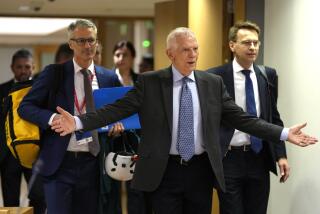Russia Gets Some Breathing Room From IMF
- Share via
MOSCOW — After months of tough negotiations, Russia won agreement in principle Monday on a new loan from the International Monetary Fund that could save the country from a disastrous default on its existing debt to the financial institution and win it some economic breathing space.
Prime Minister Yevgeny M. Primakov promised that, in exchange, his government would produce a 2% primary budget surplus, though questions remain about his ability to deliver the program demanded by the IMF.
Primakov emerged from more than three hours of talks in Moscow with Michel Camdessus, the IMF managing director, and said final details of the new loan will be worked out when an IMF delegation comes to Moscow next week.
Camdessus, who reportedly had earlier promised “good news” for Russia, stood beside Primakov during the announcement. Neither would say how much the loan would be worth.
The Russian news services Interfax and Itar-Tass quoted sources close to the talks as saying the loan will be for $4.8 billion, though the figure could not be independently confirmed. That is the amount Russia needs to make payments on its debts to the IMF this year and prevent a default that would plunge Russia into a new crisis and relegate it to the small group of nations that are financial pariahs.
But IMF officials in Washington sought to dampen speculation that a final pact was in hand.
“We have reached an agreement on a broad framework, but details still must be filled in,” an IMF spokesman said Monday. “Contrary to some press reports, there is no agreement on amounts” or on a date for the IMF board to release funds.
“This is still a work in progress,” the IMF official said.
It has taken Russia months of negotiations to extract this agreement in principle. In a sign of their desperation for new loans, Russian officials have repeatedly claimed over the past few months to be on the brink of a deal with the IMF, when the sides were still nowhere near agreement.
There are serious questions hanging over the deal, given Western doubts that Primakov’s government can produce the economic policy demanded by the IMF.
However, the IMF has considerably softened its demands on Russia, requiring a primary budget surplus equivalent to 2% of gross domestic product compared with an earlier demand for a surplus of 3.5%. The primary budget does not include the cost of servicing Russia’s debt.
The IMF suspended an earlier, $22.6-billion loan to Russia after a devaluation of the Russian currency, the ruble, on Aug. 17 and an ensuing financial crisis.
If the deal goes through and Moscow does get the new loan, the IMF is likely to insist that the money be used to repay Russia’s foreign debts.
While the West remains skeptical about Russia’s ability to raise adequate revenue to fund its budget--particularly given a plan to cut the value-added tax paid by consumers from 20% to 15%--Otto R. Latsis, a Russian economist and deputy editor in chief of Noviye Izvestia, said it would not be difficult for Russia to achieve the 2% primary budget surplus target this year.
“Besides, no one will be eager to catch Russia red-handed this year, because the decision to allocate the loan to Russia is purely political and has nothing whatsoever to do with any economic indices in the world,” Latsis said.
Jonathan Peterson in The Times’ Washington Bureau contributed to this report.
More to Read
Sign up for Essential California
The most important California stories and recommendations in your inbox every morning.
You may occasionally receive promotional content from the Los Angeles Times.













